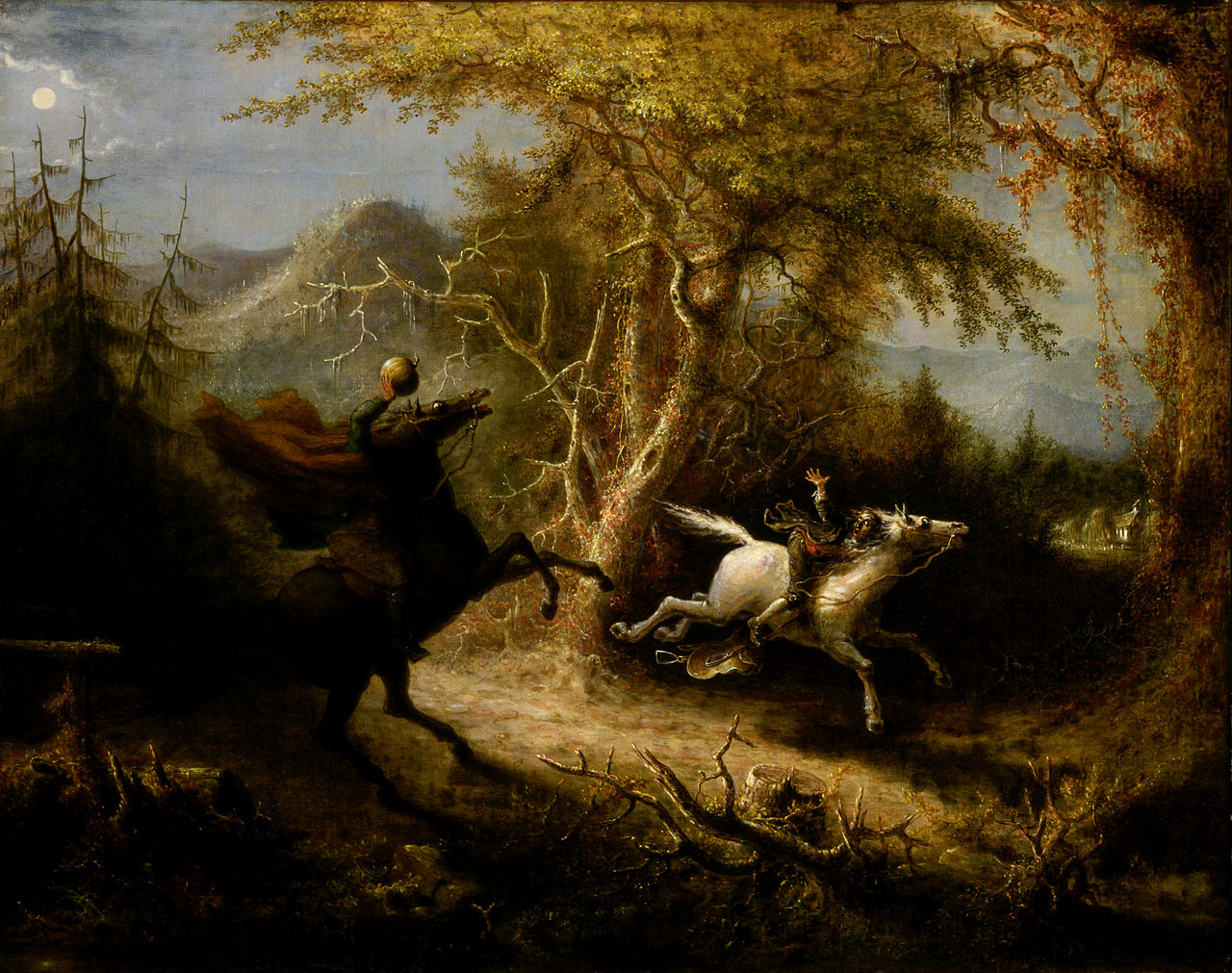Quidor, The Headless Horseman Pursuing Ichabod Crane, 1858
In preparation for this evening ...
It was the very witching time of night that Ichabod,
heavy-hearted and crestfallen, pursued his travels homewards, along the sides
of the lofty hills which rise above Tarry Town, and which he had traversed so
cheerily in the afternoon. The hour was as dismal as himself. Far below him the
Tappan Zee spread its dusky and indistinct waste of waters, with here and there
the tall mast of a sloop, riding quietly at anchor under the land. In the dead
hush of midnight, he could even hear the barking of the watchdog from the
opposite shore of the Hudson; but it was so vague and faint as only to give an
idea of his distance from this faithful companion of man. Now and then, too,
the long-drawn crowing of a cock, accidentally awakened, would sound far, far
off, from some farmhouse away among the hills—but it was like a dreaming sound
in his ear. No signs of life occurred near him, but occasionally the melancholy
chirp of a cricket, or perhaps the guttural twang of a bullfrog from a
neighboring marsh, as if sleeping uncomfortably and turning suddenly in his
bed.
All the stories of ghosts and goblins that he had heard in
the afternoon now came crowding upon his recollection. The night grew darker
and darker; the stars seemed to sink deeper in the sky, and driving clouds occasionally
hid them from his sight. He had never felt so lonely and dismal. He was,
moreover, approaching the very place where many of the scenes of the ghost
stories had been laid. In the centre of the road stood an enormous tulip-tree,
which towered like a giant above all the other trees of the neighborhood, and
formed a kind of landmark. Its limbs were gnarled and fantastic, large enough
to form trunks for ordinary trees, twisting down almost to the earth, and
rising again into the air. It was connected with the tragical story of the
unfortunate André, who had been taken prisoner hard by; and was universally
known by the name of Major André’s tree. The common people regarded it with a
mixture of respect and superstition, partly out of sympathy for the fate of its
ill-starred namesake, and partly from the tales of strange sights, and doleful
lamentations, told concerning it.
As Ichabod approached this fearful tree, he began to
whistle; he thought his whistle was answered; it was but a blast sweeping
sharply through the dry branches. As he approached a little nearer, he thought
he saw something white, hanging in the midst of the tree: he paused and ceased
whistling but, on looking more narrowly, perceived that it was a place where
the tree had been scathed by lightning, and the white wood laid bare. Suddenly
he heard a groan—his teeth chattered, and his knees smote against the saddle:
it was but the rubbing of one huge bough upon another, as they were swayed
about by the breeze. He passed the tree in safety, but new perils lay before
him.
About two hundred yards from the tree, a small brook crossed
the road, and ran into a marshy and thickly-wooded glen, known by the name of
Wiley’s Swamp. A few rough logs, laid side by side, served for a bridge over
this stream. On that side of the road where the brook entered the wood, a group
of oaks and chestnuts, matted thick with wild grape-vines, threw a cavernous
gloom over it. To pass this bridge was the severest trial. It was at this
identical spot that the unfortunate André was captured, and under the covert of
those chestnuts and vines were the sturdy yeomen concealed who surprised him.
This has ever since been considered a haunted stream, and fearful are the
feelings of the schoolboy who has to pass it alone after dark.
As he approached the stream, his heart began to thump; he
summoned up, however, all his resolution, gave his horse half a score of kicks
in the ribs, and attempted to dash briskly across the bridge; but instead of
starting forward, the perverse old animal made a lateral movement, and ran
broadside against the fence. Ichabod, whose fears increased with the delay,
jerked the reins on the other side, and kicked lustily with the contrary foot:
it was all in vain; his steed started, it is true, but it was only to plunge to
the opposite side of the road into a thicket of brambles and alder bushes. The
schoolmaster now bestowed both whip and heel upon the starveling ribs of old
Gunpowder, who dashed forward, snuffling and snorting, but came to a stand just
by the bridge, with a suddenness that had nearly sent his rider sprawling over
his head. Just at this moment a plashy tramp by the side of the bridge caught
the sensitive ear of Ichabod. In the dark shadow of the grove, on the margin of
the brook, he beheld something huge, misshapen and towering. It stirred not,
but seemed gathered up in the gloom, like some gigantic monster ready to spring
upon the traveller.
Washington Irving, from "The Legend of Sleepy Hollow"
Washington Irving, from "The Legend of Sleepy Hollow"












































































































































































No comments:
Post a Comment